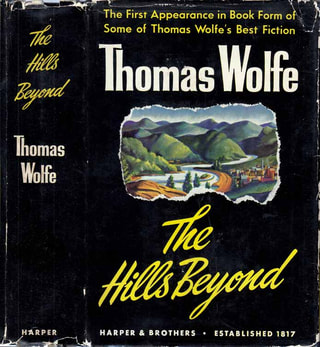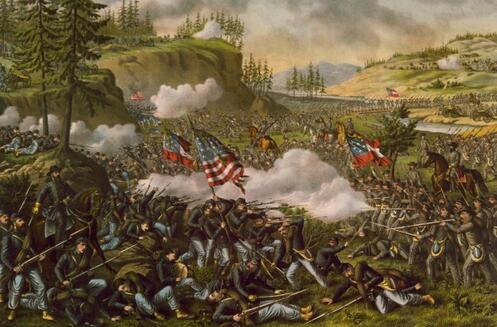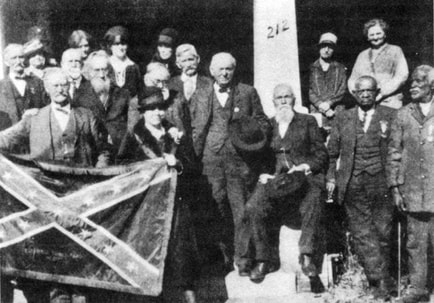 The Hills Beyond is another excellent posthumously published Thomas Wolfe work. The work contains two essays, several short stories, a one-act play, and the novella The Hills Beyond. Like my 1960 edition of Of Time and the River, this paperback is deteriorating—dark yellow, nearly brown pages, stains at the bottom corners where pages have been touched often. I couldn’t part with these copies after my Mom died. She loaned her other Wolfe novels to college friends of mine years ago, never to be returned. I’ve tried to find used copies published closer to the original publication date to replace those. The Hills Beyond, summarized below, exhibits Wolfe’s diversity in composition. The Lost Boy Death is a theme for Wolfe. He lost one brother, Grover in his books, at age twelve and his favorite brother, Ben, in the influenza pandemic of 1918. The long illness and eventual death of his father are either part of the plot or referred to in all of the autobiographical novels. This short story provides a childhood character study of Grover and also their father, both introduced in Look Homeward Angel. Wolfe’s description of a 1904 day in a small North Carolina town is memorable in its detail—what people are wearing, the fire department horses, the retail shop windows with the new Singer sewing machines, and pictures of the Victrola with the dog listening to his master’s voice. The first scene in the story is Grover’s interaction with a sullen local businessman who cheats Grover. His father subsequently comes heroically to his rescue to right a wrong. The story is especially touching as Wolfe often wrote of his father’s darker side. The second part of the story moves to the sorrow family members experience at the time of Grover’s death, and then to Eugene’s memories of the event years later. On a visit to St. Louis when in his 30s, he stops at the rooming house where the family stayed for seven months in 1904 during the World’s Fair. The current owner invites him in. He stands in the room where Grover died and then later sits on the front steps. He wonders if he can only sit on the stairs of this house once more in solitude in the afternoon, could he recreate the memories of what he had seen and been at the time back again. He soon realizes that he can’t. Gentlemen of the Press: A One-Act Play In this one-act play, Wolfe mocks reporters in a 1916 newsroom scene. They banter over people and unimportant news. Most of them knew a soldier who has just been reported killed in France and whom they harassed when they were young. They remember his mother and wonder why he volunteered overseas. America wasn’t even involved in the war. One says, “…in France…some bastard’s getting his right at this moment.” The scene direction notes that as the character says this: He stretches slowly with an air of weariness and disgust. Their weariness and trivializing comments on the war and state of the world is unnerving. The characters reflect others in Wolfe’s novels with whom he has little patience, those who exhibit a negative side of human nature—lazy, uncaring, and unconcerned.  Short Stories: Chickamauga and “On Leprechauns” “Chickamauga,” based on a first-person account of the Civil War battle from Wolfe’s ninety-year-old Southern ancestor, is arguably one of Wolfe’s best short stories and often appears in anthologies of his work. “What a Great War” the teller relates as he describes his view of battles in Chickamauga, Shiloh, and Stone Mountain. He summarizes in his mountain vernacular, “Hit’s all so strange now when you think of hit. Hit all turned out so different from the way we thought.” He still embraces the Lost Cause of the Confederacy following the Civil War, a negationist ideology defending the belief that the cause of the Confederate States was a just and heroic one. Wolfe has some fun with another ethnic group in “On Leprechauns.” “…Ireland has always swarmed with geniuses,” he says, alluding to its artists and writers. They “…are among the shyest and most modest races in the world.” Return of the Prodigal Wolfe reminds us in an essay on writing, The Story of a Novel, that not everything he writes actually happened in Ashville. After publishing Look Homeward, Angel, he realizes that he and others sometimes imagined or filtered historical truth. As in my earlier posts comparing my Mother’s family and that of Wolfe’s, I believe she also filtered truth. My father knew that the warm memories of her childhood were not fact; he could tell by what was said and unsaid when we visited her family in later years. On these short, infrequent visits, we were treated as celebrities of sorts as Mom was no longer involved in their perpetual family difficulties. After seven years’ absence from Asheville, Wolfe was at least publicly forgiven, overwhelmed with speaking engagements and dinner requests, and asked to edit people’s writing. He was famous and had put Ashville on the map, so to speak.  The Hills Beyond This novella has ten chapters, which begin in September 1593 when the first foreigner landed at Old Catawba (North Carolina). Wolfe describes history from that point in the context of the Joyner genealogy presented in his novels. He writes a scathing description of Southern lawyers, kind of medicine men in the community, the profession into which mountain folks pushed their most gifted sons. According to Wolfe, most eventually went into politics and, for many it became a sideshow. Southern Civil War history and myths dishearten and frustrate Wolfe. He describes Theodore, a relative who returned from the war, as a representative of the South’s misguided attitude that the South had been triumphant even in its defeat. “The war became no longer a thing finished and done with, a thing to be put aside and forgotten as belonging to the buried past, but a dead fact recharged with new vitality and one to be cherished more than life itself.” The mythology became a folk-religion. It was a dream of vanished glories, ones that had never been, but that one could turn to against the ugly realities of the period. Theodore opens a military academy, wears his grey uniform, and treats his black servants as if the Civil War had never occurred. In a later chapter, “The Dead World Relived,” another of the Joyner relatives, intelligent and a good observer of men, notes that the Southern myth, including the “romantic flummery about the South, never existed. People who had always been poor now claimed that they had lost everything, bragged that they had been rich and owned slaves—when many had never even seen a Negro—just to make themselves feel important.” Wolfe’s works would indicate that he was relentlessly disheartened by the Southern Lost Cause mentality of some after the war and felt that it was detrimental to them as individuals and to the South itself advancing.
A final word from Wolfe... "Fiction is not fact, but fiction is fact selected and understood, fiction is fact arranged and charged with purpose." Thomas Wolfe Next Time: VJ (Victory Japan) Day India: 1945 Ann Otto writes fiction and nonfiction and blogs on history and writing. Her historical novel, Yours in a Hurry about Ohioans relocating to California in the 1910’s, is based on fact and oral history and is available online at Amazon, Barnes & Noble, and Kindle. Her academic background is in history, English, and behavioral science, and she has published in academic and professional journals. She enjoys speaking with groups about all things history, writing, and the events, locations, and characters from Yours in a Hurry and her current projects, including research on Ohio’s Appalachia in the 1920’s and a compilation of her father’s World War II letters. Ann can be reached through the website, https://www.ann-otto.com/ , at Facebook@Annottoauthor and at www.Goodreads.com.
0 Comments
|
Archives
August 2020
Categories
All
|
 RSS Feed
RSS Feed